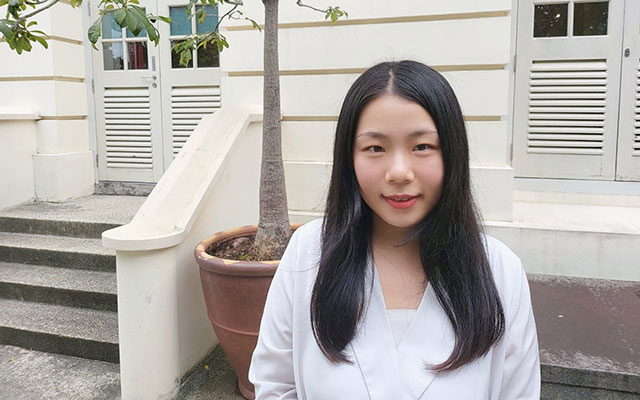
What made you decide on Singapore and SMU for your postgraduate studies?
I prefer working in Singapore, given my previous education experience with NUS in Singapore and previous working experience in Shanghai.
I chose SMU because SMU provides practical knowledge and well-rounded training for students to seek a job after graduation.
Why did you choose the MSc in Accounting with Data & Analytics (MSA) programme?
MSA is a unique programme that combines accounting, finance, and coding. As I already had working experience before I joined MSA programme, I realized that coding skills would provide me with more advantages than pure finance/accounting knowledge. For any business/ finance/accounting-related background, we can build such backgrounds by ourselves through internships, as experience is more important for the above areas. While it’s hard for me to learn coding by myself as I don’t have any coding background, I chose to spend money on some coding-related programme. However, my dream is not to be a programmer, so I didn’t choose any pure coding programme.
How did the actual SMU experience meet your expectations?
SMU experience equipped me with soft and technical skills for working and provided me with the opportunity to work in SG.
Did you experience any challenging times during your postgraduate studies?
Since I had a full-time internship (6 months) from the beginning of the second semester, I was quite busy and overwhelmed. Thanks to my group members, I can still keep up with my studies and learn from them when I'm left behind.
How has the SMU MSA helped to prepare you to thrive in your career?
I appreciate all my profs for teaching, training, and equipping me with practical knowledge and skills. Especially Prof. Wang Jiwei, even though his course is a little hard for me, I very much appreciate that his decision changed my life – as he is the interviewer for my admission interview, he provided me the opportunity to join MSA programme and we had a good talk during the interview, which enhanced my confidence to choose MSA programme. I also feel fortunate to take courses from Prof. Subhajit DATTA, Prof. Thivya KANDAPPU and Prof. Yuanto. Their courses laid a solid foundation for my career. My group members such as Jiahwang, Bryan, Lingxiao, Hanny and Nicolas were also very helpful in studying and striving well together.
Another good thing is that during my internship, I understood my interests and disadvantages. Therefore, during my job hunting, I focused on matching my interest and capability with the job scope instead of wasting time in some areas that may not be suitable for me. Meanwhile, my internship equipped me with many market insights, which allowed me to share more ideas with my interviewers. Even though I did not proceed with this career path, I still believe this internship is a necessary and meaningful experience.
What advice do you have for prospective international students?
The most important advice I would give is to explore more career experiences during the study period because the opportunity cost of changing jobs while studying is the lowest. The more positions I tried, the more I understood about my interests, skillsets, and capabilities. Frankly, it may take a lot of time to know what kind of career is suitable for us, but we will become closer and closer to the answer during the exploration journey.
What were some skills you picked up during the MSA programme that has contributed to your current role?
In terms of technical skills, our coding courses, including programming with data, data management, DMV, and FFA all made me build a solid foundation for Python, R, Tableau, and SQL. Our finance courses, including AFI, and AVI, also provide me more ideas about applying coding skills to finance area, which is very close to my current job scope.
I also picked up soft skills such as communication skills, presentation skills, project management, and leadership. Since my group members were mostly all “foreigners” for me, I practiced my oral English while doing our group project. I am also very active in being the presenter of my group, so my presentation skills have also been enhanced when doing my group project, making me spend less time preparing interviews/ oral English. This is quite important, as the opportunity is fleeting, we need to grab it when it comes. As I also engaged in project management, including time management and quality control, my project management and leadership also improved.
Any other info/advice you would like to include?
Please eat well, sleep well, study well and be well-prepared for your future career.